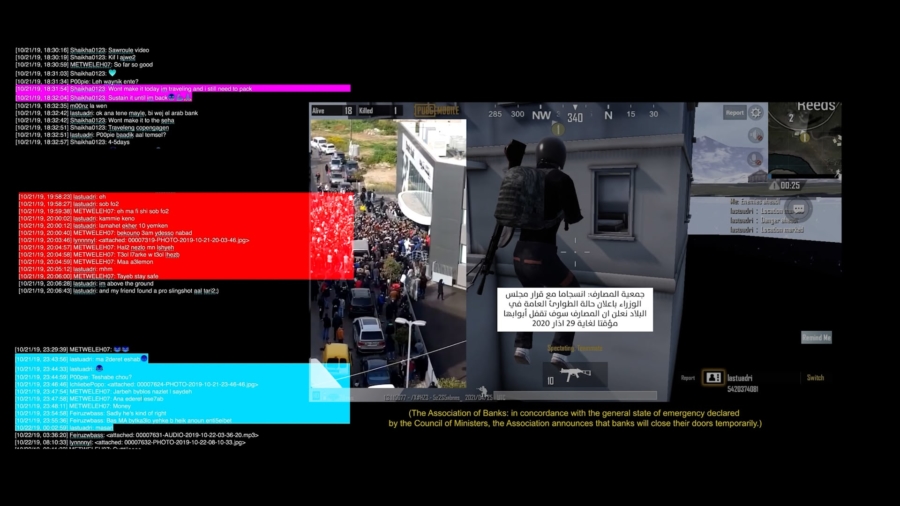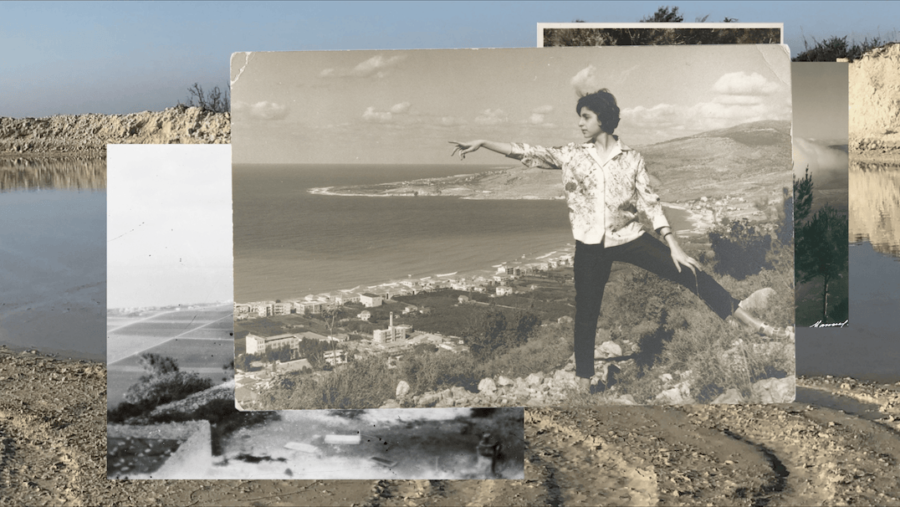
Wednesday, 11 December 2024, 10:15–11:45
Screening of films by Shuruq Harb and conversation between the filmmaker and Nadim Choufi.
In PopG ClanC (2024), a film by Monica Basbous & Charbel Alkhoury, WhatsApp conversations flood the sidelines, but also narrate, a screen of protests, crises, and collapses in Lebanon since 2019. In Basbous’s 2022 film Mountains at sea, the scale of the modernist dream is superimposed with its ecological disasters while in their latest research, Shell-Shocked, Basbous examines the diminutive writings of messages on missiles. What connects them is how Basbous confronts the scales of events when they land in our laps or lands.
This event will begin with a screening of PopG ClanC (2024) and Mountains at sea (2022) followed by a presentation by Basbous on their work. Nadim Choufi will join the artist after their presentation for a conversation.

PopG ClanC by Monica Basbous & Charbel Alkhoury
2024, video, 20 minutes
PopG ClanC is a WhatsApp group created by online gamers in early 2019. From personal footage to news headlines, media shared in the group are overlaid on their recorded gaming to create this film as the members of PopG ClanC navigate the events of the 2019 popular uprisings in Lebanon and the ensuing financial, economic, and infrastructural collapse of the country amid a global pandemic. Their archived chat unfolds as if in real-time with an associative montage between moments of joy and fear, collectivity and isolation, protest and violence to demonstrate that such parallels of progress rarely exist without intersecting, but rather it is their enmeshing that allows for a continuity of collective existence. In this short film, Monica Basbous and Charbel Alkhoury offer an insight into the inner mechanisms of the group at work as it shapeshifted into a revolutionary cell, a grassroots neighborhood group, an information sharing and verification system, a mutual aid network, and a support system depending on the times.
PopG ClanC is: [M00nz, Anxiety Attack, P00pie, Lastuadri, Jfara7, Leil88, Shaikha0123, Moudira2aldir, Feiruzwbass, Metweleh07, Lynnnnyl, ZaThug, Gabzoy, IchliebePopo, Rips88, Melm0, W84godo]

Mountains at sea by Monica Basbous
2022, video, 4 minutes
Mountains at sea uses personal field documentation and photographic archival research to trace the territorial transformations of the Greater Beirut area in relation to the Koura region in the north of Lebanon. It attempts to reconstruct various points of the landscape while highlighting their entanglement and the dissonance between the modernist dream and its violent repercussions.
Nadim Choufi is a visual artist. Primarily through sculpture and film, he explores how concepts of progress become alluring and the ways they materialize in people, land, and objects that live through or under their definitions. He uses notions of desire and hybridity from visual and literary practices to trespass categories of development that are often unquestioned.
Monica Basbous’ work: www.monicabasbous.com
Basbous, Monica. 2023. “The Violence of Extractive Urbanization: Dying to Live in Lebanon.” Middle East Critique, August, 1–22. https://doi.org/10.1080/19436149.2023.2245295.
Asad, Talal. 2007. On Suicide Bombing. New York, N.Y.: Columbia University Press.
Duffield, Mark. 2011. “Total War as Environmental Terror: Linking Liberalism, Resilience, and the Bunker.” South Atlantic Quarterly 110 (3): 757–69. https://doi.org/10.1215/00382876-1275779.
McClintock, Anne. 2009. “Paranoid Empire: Specters from Guantanamo and Abu Ghraib.” Small Axe: A Caribbean Journal of Criticism 13 (1): 50–74. https://doi.org/10.1215/07990537-2008-006.
Li, Darryl. 2024. “The Forever War, Foregone.” American Anthropologist 126 (3): 521–23. https://doi.org/10.1111/aman.13976.
Puar, Jasbir K. 2005. “On Torture: Abu Ghraib.” Radical History Review 2005 (93): 13–38. https://doi.org/10.1215/01636545-2005-93-13.